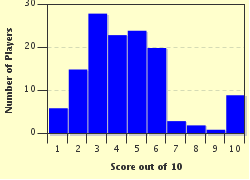Quiz Answer Key and Fun Facts
1. John Brown was a fiery abolitionist determined to destroy slavery anyway he could. On October 16, 1859, he, in Christ's name, led a band of armed men into Harpers Ferry, Virginia. Who was the first person to be mortally wounded by Brown's men during this raid?
2. On April 12, 1861, Confederate forces, refusing to accept the leadership of the newly elected Republican president, attacked Ft. Sumter and began the US Civil War. Both sides quickly formed armies and huge battles were fought. In the military camps, at first, the soldiers showed little Christian piety, preferring to engage in profanity, gambling, drunkenness, and sexual licentiousness. However, as the war progressed, and extreme horror gripped both sides, the military men began to turn to God for solace from their agony. During the end of 1863 to the Summer of 1864, what remarkable spiritual event took place?
3. Who said "We must forgive our enemies. I can truly say that not a day has passed since the war began that I have not prayed for them."
4. November 25, 1860: Abraham Lincoln has his first picture taken with his new beard, and also does what?
5. Brigadier General William Pendleton of the Virginia Military Institute (VMI) brought to war four special items from the Institute. These items were named "Matthew, Mark, Luke, and John" by the cadets. What were they?
6. Abraham Lincoln was the first president to use the phrase, "One nation under God"?
7. What ex-slave led a group of 300 black Union troops on a raid into South Carolina along the Combahee River in the spring of 1863?
8. The Constitution of the Confederate States of America differed from the Union Constitution in what clear way?
9. Amongst Union soldiers this most popular song had the following opening lyrics:
"Mine eyes have seen the glory of the coming of the Lord:
He is trampling out the vintage where the grapes of wrath are stored;
He hath loosed the fateful lightning of His terrible swift sword:
His truth is marching on."
What is the name of this song?
10. Which Confederate General, noted for his unflinching bravery in battle, asserted the following answer when questioned about the danger of his exposure to enemy fire: "My religious belief teaches me to feel as safe in battle as in bed. God has fixed the time for my death. I do not concern myself about that, but to always be ready, no matter when it may overtake me."
Source: Author
star_gazer
This quiz was reviewed by FunTrivia editor
bloomsby before going online.
Any errors found in FunTrivia content are routinely corrected through our feedback system.

